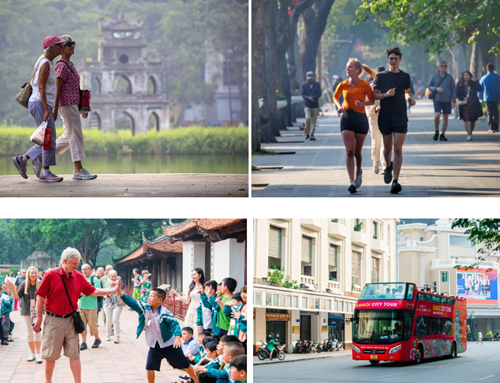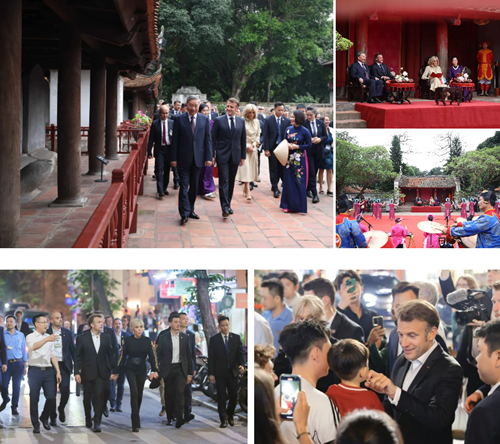Visa rules get a glow-up
On March 7, 2025, the Vietnamese Government issued a resolution granting visa exemption to citizens of Germany, France, Italy, Spain, the U.K., Russia, Japan, the Republic of Korea, Denmark, Sweden, Norway, and Finland. Accordingly, from March 15, 2025 to March 14, 2028, these travelers can stay in Vietnam for up to 45 days, irrespective of their passport or travel purpose, with extensions to be considered under Vietnamese law. Earlier, on January 15, 2025, another resolution extended visa-free entry for up to 45 days to citizens of Poland, the Czech Republic, and Switzerland as part of a broader tourism stimulus scheme. These moves are paying off: A whopping 7.6 million foreign visitors flooded Vietnam from January to April 2025, a 23.82% jump year-on-year, according to the Vietnam National Authority of Tourism (VNAT).
    |
 |
|
Hanoi capital city is one of the favorite destinations for international tourists. |
VNAT Director General Nguyen Trung Khanh called visa a golden ticket to pulling in crowds, but he is clear that it needs coordinated efforts across multiple sectors to keep the momentum going in this fast-moving global travel scene.
In recent years, the Government has been busy streamlining its visa framework, rolling out e-visas with simpler processes and longer stays, plus exemptions for select countries. The Ministry of Culture, Sports and Tourism is collaborating with other agencies to fine-tune visa procedures, syncing them with specific tourism campaigns and major diplomatic, sport, and culture events.
Khanh is pushing for short-term visa waivers targeting big-spending markets with direct flights and niche groups like athletes, performers, filmmakers, and journalists flocking to Vietnam for events. But he’s also got his eye on national security, warning that open borders can’t come at the cost of stability.
Tourism boom fueled by visa shake-up
Visa exemption is seen as a key to dominating the tourism race. Thailand is waving in citizens from 98 countries for 30-90-day stays, Malaysia has got 165 countries on its visa-free list, and Singapore’s at 163. Vietnam, by contrast, has a shorter list of visa-exempt countries and tighter stay limits. To hit its goal of 22-23 million arrivals in 2025, the Government is offering 12-country visa exemption and e-visas to over 80 nations, but red tape and limited flexibility are still tripping things up.
    |
 |
|
France is one of the 16 countries exempt from entry visa requirements to Vietnam from March 1, 2025. In the photo: French President Emmanuel Macron and his spouse visit the Temple of Literature, stroll through the Hanoi Old Quarter during their state visit to Vietnam from May 25-27, 2025. |
Chairman of the Board of Directors of Vietravel Nguyen Quoc Ky called visa the first “key” to unlocking Vietnam’s tourism goldmine. Vietnam, he suggested, should study and adopt flexible visa models from its neighbors, like seasonal visas, nationality-specific deals, or special passes for business travelers, scientists, and public-private partners. This could also extend to bilateral or strategic partnerships.
Nguyen Thu Thuy, Marketing Director at major Vietnamese conglomerate Vingroup, has her own ideas: conditional visa exemptions, such as waiving visas for tourists booking all-inclusive packages through reputable international travel agencies and staying at licensed accommodations with set itineraries. She is also pitching pilot seasonal or campaign-based visa waivers to test their impact before nationwide roll-out.
For niche markets like MICE (Meetings, Incentives, Conferences, and Exhibitions) and medical tourism, Thuy floated a “golden visa” for multiple entries over three to five years, aimed at experts, scientists, and investors, as well as frequent high-rollers seeking luxury experiences like five-star hotels, golf, or medical treatments.
To make these visa policies a real game-changer, Vietnam must also improve service quality, upgrade tourism infrastructure, and develop one-of-a-kind experiences. Dao Thi Bich Huong, General Director of SeaGate Travel, noted that more open visa policies would draw more international conferences, exhibitions, and events, giving a fat boost to tourism and other industries.
But visas are just the start. The bigger challenge is how to encourage visitors to stick around, drop more cash, and want to return. Right now, Vietnam is missing the kind of standout tourism products that make travelers stay longer. Many hot spots are plagued by uneven service quality, inadequate infrastructure, pollution, and weak management, especially during peak seasons.
For Vietnam’s tourism industry to truly make breakthrough and grow sustainably in the coming years, expanding and refining visa policies must be a top priority. At the same time, Vietnam needs to continue pouring cash into infrastructure and transportation networks, and pro-level marketing while crafting diverse, distinctive tourism products.
Improving service quality, training a top-notch workforce, cleaning up the environment, and pushing green tourism are also critical to creating a well-rounded experience for visitors. With these measures adopted in a coordinated manner, visa policy will not only act as an “open door” to foreign travelers but also rocket the country’s tourism to the next level.
Source: VNA